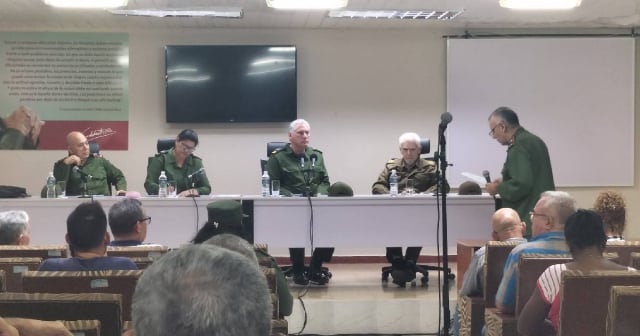Cuban leader Miguel Díaz-Canel strongly denied that Cuba is in a state of collapse, describing the news and images circulating on social media as an "enemy campaign by haters."
During a meeting of the National Defense Council on Thursday, Díaz-Canel urged the dissemination of information regarding the progress in the country's recovery following the devastating impact of Hurricane Rafael, which primarily affected the province of Artemisa and the western region of Cuba.
"We need to provide a lot of information about how we are recovering, about what actually happened, and to dismantle an enemy campaign that the haters have launched, claiming that Cuba is collapsing. No one here is collapsing; we are standing firm and fighting," declared the leader.
Hurricane Rafael hit the island this week, causing significant material damage and exacerbating the crisis in a country already plagued by blackouts and shortages of basic resources.
Díaz-Canel emphasized that they have successfully restored the National Electro-Energetic System; actions are underway to recover from the damages caused by the cyclone; and there have been no reported loss of human life so far.
The Cuban government has deployed brigades from the Revolutionary Armed Forces (FAR), the Ministry of the Interior (MININT), and the Ministry of Agriculture (MINAG) to carry out recovery efforts in the affected areas.
The authorities have shared images of Díaz-Canel visiting strategic locations in Havana and Artemisa, seemingly in an attempt to showcase his alleged leadership during times of adversity.
Díaz-Canel's speech, which he has used in other recent crises, aims to convey resilience and strength in response to criticism, particularly following the reported disorganization in the management of Hurricane Oscar in Guantánamo last month.
Complaints from the population against the government have made clear the delays in the delivery of supplies to those affected, the poor evacuation of people in Guantánamo, and the lack of electricity that has resulted in blackouts lasting over 20 hours across the country for weeks.
From the account of the Presidency of Cuba on the social network X, posts were shared showing the president asserting that the country was "prepared and organized" to face the crisis.
This rhetoric stands in stark contrast to the reality faced by a large segment of the Cuban population, who struggle to meet their basic needs amid increasing precariousness, lacking food, medicine, and fuel to cook what little they have.
What do you think?
COMMENTFiled under:
